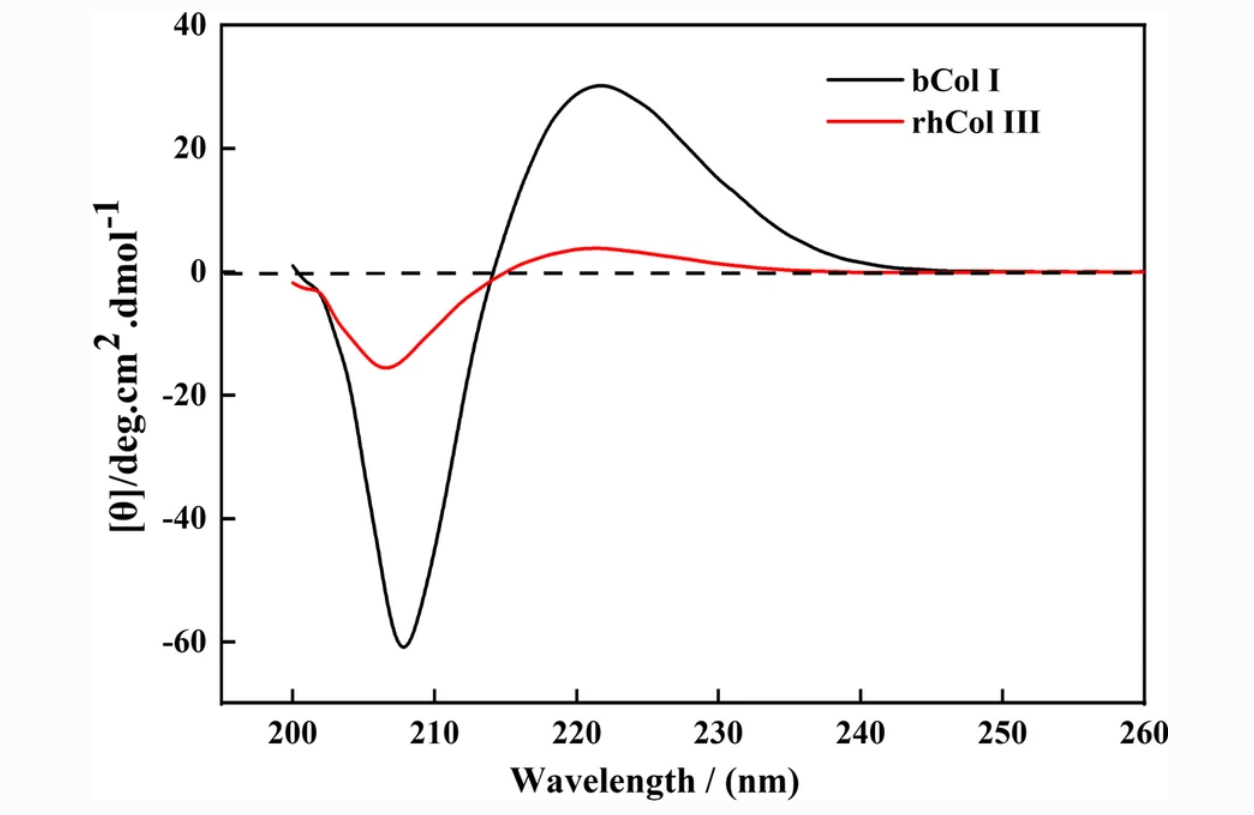Circular Dichroism Analysis Service | Recombinant Collagen
Recombinant collagen has become an essential biomaterial in regenerative medicine, tissue engineering, wound healing, and medical device development. Designed to replicate the structural and functional properties of native collagen, recombinant collagen must adopt and maintain its characteristic triple-helical secondary structure to perform biological functions such as cellular adhesion, scaffold formation, and enzymatic resistance. Therefore, accurate and reliable evaluation of structural integrity is a critical step in both early-stage development and quality control pipelines. MtoZ Biolabs offers a specialized Circular Dichroism Analysis Service for recombinant collagen designed to verify its correct folding, assess thermal stability, and ensure batch-to-batch consistency. The Circular Dichroism Analysis Service provides rapid, non-destructive structural characterization to support collagen-based product development, formulation optimization, and regulatory submission.
Circular Dichroism (CD) spectroscopy is a sensitive and widely accepted method for detecting protein secondary structures in solution. For collagen, CD provides a clear spectral fingerprint indicating triple-helix formation, with characteristic positive and negative bands in the far-UV range. In addition, CD can be used to measure thermal unfolding curves, revealing the melting temperature (Tm) and overall conformational stability under physiological or formulation-specific conditions.

Figure 1. Circular Dichroism Spectra of Recombinant Humanized Collagen Type III (rhCol III) and Bovine Collagen Type I (bCol I)
Service at MtoZ Biolabs
MtoZ Biolabs' Circular Dichroism Analysis Service is built on a foundation of high-sensitivity spectrometers, stringent quality control, and collagen-specific expertise. We tailor each analysis to the unique structural and formulation needs of recombinant collagen products, whether you are working with full-length collagen types, collagen-like peptides, or engineered triple-helical constructs.
Analysis Workflow
1. Sample Preparation
Recombinant collagen samples are prepared at the required purity and concentration, ensuring compatibility with far-UV CD detection.
2. CD Spectrum Acquisition
Samples are scanned over the 190–260 nm range using a high-sensitivity CD spectrometer to capture structural signals characteristic of the collagen.
3. Data Processing and Interpretation
Spectral data are analyzed to estimate secondary structure content and detect any deviations in folding, using validated software tools and collagen-specific reference models.
4. Comprehensive Reporting
Clients receive a complete analysis report containing raw spectra, structural analysis results, and expert interpretation to support research or quality assessment needs.
Service Advantages
☑️Custom Study Design: We offer flexible and customizable CD analysis solutions to meet your specific research and development needs.
☑️Collagen-Specific Expertise: We have extensive experience with native and engineered collagen, including type I/II/III collagen, collagen-like peptides, and scaffold materials.
☑️Advanced Instrumentation: Equipped with state-of-the-art CD spectrometers, we ensure optimal sensitivity, accuracy, and reproducibility across a wide wavelength range.
☑️High-Throughput Capability: Our standardized workflows support both small-scale experimental validation and large-scale batch testing with fast turnaround times.
☑️Comprehensive Reporting: Our deliverables include raw data along with clear, professional interpretation to support your analysis goals.
Sample Submission Suggestions
To ensure high-quality circular dichroism analysis, please follow the sample preparation and shipping recommendations below:
1. Sample Type: Please submit recombinant collagen or collagen-like peptides in aqueous solution. Samples should be free of insoluble aggregates or particulate contaminants to ensure accurate measurements.
2. Storage and Shipping: Samples should be stored at –80°C and transported on dry ice to maintain structural integrity. Repeated freeze–thaw cycles should be strictly avoided.
3. Additional Information: Be sure to include detailed documentation for each sample, including sample ID, concentration, buffer composition, and any relevant handling instructions.
*If your sample requires special handling, please contact our technical support team prior to shipment.
Deliverables
1. Comprehensive Experimental Details
2. Raw CD spectral data
3. Processed and annotated spectral plots
4. Secondary structure analysis results
5. Customized Reports Available Upon Request
Accurate structural characterization is essential for ensuring the performance and reliability of recombinant collagen in both research and product development. At MtoZ Biolabs, we are committed to providing precise, efficient, and insightful circular dichroism analysis service tailored to your specific needs. To learn more about our service or request a customized quote, please contact us.
Related Services
Recombinant Collagen Structure Characterization Service
Fourier Transform Infrared Spectroscopy Characterization Service | Recombinant Collagen
Recombinant Collagen Transmission Electron Microscopy (TEM) Analysis Service
How to order?







